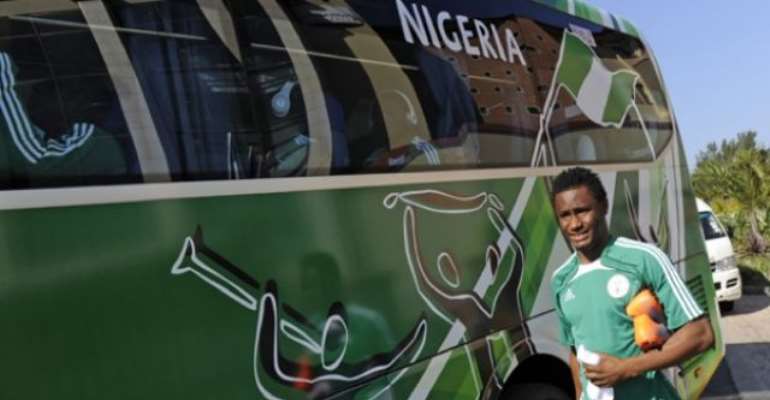NIGERIA FOOTBALL FEDERATION'S INCOMPETENCE AND JOHN OBI MIKEL'S INTRANSIGENCE

Nigeria’s long-suffering football fans were dealt a cruel blow weekend by the news that the only member of an uninspiring Super Eagles squad that plays (albeit irregularly) for a top club - Chelsea’s John Obi Mikel - would not play for the country in the World Cup starting on Friday.
In characteristic fashion, the team’s officials gave contradictory accounts of events. The co-ordinator, Emmanuel Attah was quoted as saying: "We have dropped Mikel from the World Cup after he told the team he did not want to put his career at risk as his knee injury has yet to fully heal after a recent surgery."
This was quickly followed by a different statement from the media officer, Idah Peterside, who reportedly said that "Mikel suffered a bruise to his ankle and a scan showed that he will not recover on time."
However, a few hours later, Mikel issued a statement on Chelsea’s website confirming Attah’s initial explanation. Citing the knee problem, he stated: "I did not want to risk any further damage, also I think it is in the best interest of the team for me to withdraw rather than waste a slot."
Significantly, there was no statement on the Nigerian Football Federation’s website, as was the case with Michael Essien, whose withdrawal from the World Cup was first announced on the Ghana Football Association’s website.
The poor handling of Mikel’s case by both the NFF and the player raises important issues that should be addressed to avoid a recurrence in the future.  
Poor record
It will be recalled that the then Nigerian Football Association (NFA) suspended Mikel indefinitely from all national teams in June 2007, after he ruled himself out of a Nations Cup qualifier against Uganda citing a hamstring injury.
On that occasion, Chelsea sent a letter on his behalf stating that he was undergoing treatment in London but failed to release him for independent assessment by Nigeria's doctors.
As well as missing games for the Super Eagles, Mikel also failed to respond to calls to play for the country's under-23 team. This led to his absence at the 2008 Olympic Games where the Dream Team lost in the final to an Argentinean team inspired by Barcelona’s Lionel Messi.
Against this background, Mikel was under the spotlight from the time he joined the rest of the Super Eagles squad late at their pre-World Cup training camp in London a week ago.
The manager Lars Lagerback considered him fit enough for inclusion in the provision 30-man squad and repeatedly gave reassurances over his fitness. For example, although he rested the midfielder in the friendly against Colombia last weekend Lagerback explained that "this was just a precaution" and that "there was nothing wrong" with the player.
Independent medical assessment
Annexe 1 of the FIFA Regulations on the Status and Transfer of Players provide detailed rules on the release of players to their national teams.
Paragraph 4 stipulates that: "A player who due to injury or illness is unable to comply with a call-up from the association that he is eligible to represent on the basis of his nationality shall, if the association so requires, agree to undergo a medical examination by a doctor of that association’s choice."
The NFA’s request for an independent assessment of Mikel’s apparent injury in 2007 was denied by the player and Chelsea. On that occasion, the NFA did not appear to have requested FIFA to sanction either the player or Chelsea.
Similarly, the statements coming out of South Africa this time indicate that it was the player, rather than the NFF, that decided that he could not play in the World Cup.
Again this contrasts with the case of Michael Essien, who was assessed and ruled out of the World Cup by a combined team of medical experts from the Ghana Football Association and Chelsea.
Work permit
In order to qualify for a work permit under UK immigration law, a player from outside the European Union must have played for his country in at least 75% of its competitive "A" team international matches (including World Cup finals and qualifiers and the African Cup of Nations finals and qualifiers) he was available for selection during the 2 years preceding the date of the application.
Furthermore, the player’s country must be at or above 70th place in the official FIFA World Rankings when averaged over the 2 years before the date of the application.
Therefore, any Nigerian footballer that does not otherwise have a right to work in the UK cannot play professional football in England or Scotland or Wales unless they play for Nigeria consistently and Nigeria maintains a decent ranking by FIFA.
Indeed, it is fair to say that had Mikel not been recalled to the Super Eagles following his apology to the nation in 2008, he would not qualify for a work permit under UK law today.
Conclusion
Compared to other professionals, footballers’ careers are extremely short, as they are dependent on their bodies that are constantly exposed to risk and subject to rapid decline.
Therefore it is perfectly understandable that they should take scrupulous care of themselves, especially in light of the fact that most of them lack good education and thus depend on football to provide for them and their dependents long after their retirement.
However, the privileged position footballers enjoy in their countries of origin should come with some responsibility, particularly where they rely on playing for their country to further their careers abroad.  
In these circumstances, no player should be allowed to use and dump his country when it suits him. This is why FIFA empowers the local football associations to have the final say on matters relating to the participation of eligible players in international competitions.
 
